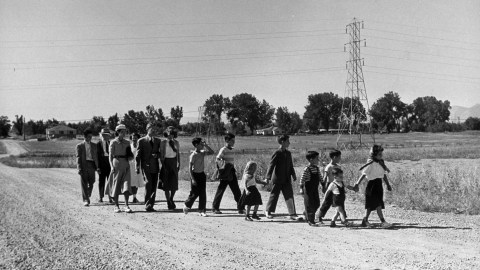A larger family worsens kids’ cognitive development, suggests 30-year study

- Over the past few decades, scientific research has shown that children in larger families perform worse in school, score lower on cognitive tests, and attain fewer years of education than kids in smaller families.
- A 30-year study largely confirms these findings. Additional siblings have lower cognitive scores than their older siblings. Older siblings’ cognition and behavior also suffer as they gain siblings, potentially because parents pay less attention to their needs.
- The results counter a commonly held belief that only children suffer intellectually and behaviorally from growing up “alone.”
The average number of children per family in the United States has fallen dramatically, from seven in 1800 to fewer than two in 2018. That’s good news for kids’ cognitive development, suggests a recently published study.
Over the past few decades, scientific research has shown that children in larger families perform worse in school, score lower on cognitive tests, and attain fewer years of education than kids in smaller families. Researchers theorize that additional children stretch parental resources thin, leaving parents with less time, energy, and money to devote to their kids’ development. For example, parents might read to children less, not have the time to ensure school attendance, or lack the savings to pay for tutors or after-school programs.
Family size and childhood development
Yet some researchers contend these results might be spurious, shaped by confounding variables such as parenting style or age. After all, parents with more children are likely to be younger and have different personalities compared to parents who have fewer.
To control for these factors, Professor Wei-hsin Yu, a social demographer and vice chair of the sociology department at UCLA, and Hope Xu Yan, a doctoral candidate in sociology at the University of Maryland, tracked the children of all 6,283 women enrolled in the Bureau of Labor Statistics’ NLSY79 study. Over 30 years, these kids were regularly given a standardized vocabulary test to track their cognitive development. Mothers were also asked to periodically assess their children’s behavior with age-appropriate surveys. Researchers particularly watched for antisocial, anxious, hyperactive, dependent, and antagonistic behaviors.
Tallying the results, Yu and Yan confirmed the results of prior studies: the larger the family, the lower the kids’ average cognitive scores. Later-born siblings scored worse at the same age than did their older siblings, suggesting that parents allocate less time to their development as time and money grow strained with extra children. The researchers also found that older siblings’ cognitive scores deteriorate as they gain siblings. This effect weakens for later-born siblings.
“Earlier children experience the greatest reductions, because they lose the most parental attention,” the researchers explained. “Because parental resources become increasingly restricted as family size grows, third- and later-born children are likely to receive so little nonessential resources that their share can barely be diluted by a new, younger sibling.”
Cognitive development vs behavior
While cognitive development took a hit, kids’ behaviors were assessed as better on average in larger families. This was primarily true for younger siblings, however. First- and second-born kids displayed slightly more behavioral problems as they gained siblings, perhaps due to reduced parental attention.
These results lead to two interesting takeaways. First, being the last-born in a large family has a notable benefit: These children are often the best behaved, at least according to mothers’ assessments. (Although, it’s possible they could have rose-colored glasses for their youngest.) Second, while having only one child is unpopular in the U.S., as parents presume that these kids’ cognitive and behavioral development suffers from growing up “alone,” the data doesn’t support this assumption.
“Our analysis indicates that first-born children score lower on cognitive tests and exhibit more behavioral problems with the arrival of the next sibling,” Yu and Yan wrote.
The researchers are confident that their analysis resolves the academic dispute about the effect of family size on children’s cognitive abilities.
“Short of setting up an experiment to assign people to have different numbers of children, our analysis has provided as strong evidence as possible to settle the debate about the effect of sibship size on intellectual development.”





